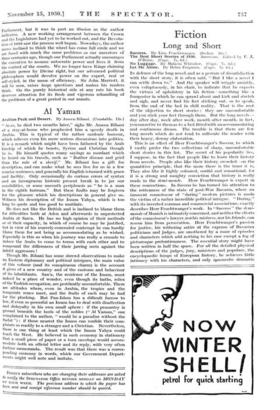Al Yaman
Arabian Peak and Desert. By Ameen Rihani. (Constable. 15s.) " Auts, he died two months later," sighs Mr. Ameen Rihani of a stay-at-home who prophesied him a speedy death in Arabia. This is typical of the rather sardonic humour, which relieves even his more serious discursions into politics. It is a remark which might have been fathered by the Arab kinship of which he boasts, Syrian and Christian though he is. He himself quotes many sayings as mordant which be heard on his travels, such as " Rather disease and grief than the rule of a sherif." Mr. Rihani has a gift for description, and can make what he sees live for us in a few concise sentences, and generally his English is turned with grace and facility. Only occasionally do curious errors of syntax and an incongruous historic present break in to jar our sensibilities, or some uncouth periphrasis as " he is a man in the eighth lustrum." But these faults may be forgiven for the pleasure which his descriptions in general give us. Witness his description of the Imam Yahya, which is too long to quote and too good to mutilate.
He does not like the British and is inclined to blame them for difficulties both at Aden and afterwards in unprotected Arabia at San'a. He has no high opinion of their methods or of their capacity, in which of course he may be justified, but in view of his scarcely-concealed contempt he can hardly blame them for not being as accommodating as he wished. Especially is this so when his journey was really a crusade to induce the Arabs to come to terms with each other and to compound the differences of their jarring sects against the infidel aggressors !
Though Mr. Rihani has some shrewd observations to make on Eastern diplomacy and political intrigues, the main value of this volume (and its conspicuous charm) is the account it gives of a new country and of the customs and behaviour of its inhabitants. San'a, the residence of the Imam, must indeed be a place of wonder, even though its baths, relics of the Turkish occupation, are pestilently uncomfortable. There are altitudes where, even in Arabia, the tropics and the temperate zones meet, and the fruits of each may be had for the plucking. But Pan-Islam has a difficult furrow to hoe, if even so powerful an Imam has to deal with disaffection and disloyalty in his own small sphere : if the peasantry is ground beneath the heels of the nobles (" Al Yaman," one complained to the author, " would be a paradise without the Sadat ") : if those nearest the Imam can confide their com- plaints so readily to a stranger and a Christian. Nevertheless, there is one thing at least which the Imam Yahya could teach the West. He believed in such economy in stationery that a small piece of paper or a torn envelope would accom- modate both an official letter and its reply, with very often further memoranda. The result was that there was a corres- ponding economy in words, which our Government Depart- ments might well note and imitate.








































 Previous page
Previous page